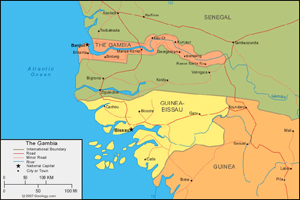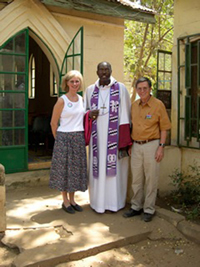Article: Tracy Radosevic: The sounds of a living tradition
A Christian storyteller says learning to tell Bible stories is a spiritual discipline that allows space for the Holy Spirit to reveal the meaning of traditional narratives.
On Our Way to The Gambia!
Tom and Amelia left Saturday, March 5 for The Gambia in West Africa. They will fly to Brussels, Belgium where they will meet up with the other 5  members of their mission team for the once-a-week flight to Banjul, the capital city. The Gambia is the smallest country on mainland Africa, bordered to the north, east, and south by Senegal, with a short coastline on the Atlantic Ocean in the west.
members of their mission team for the once-a-week flight to Banjul, the capital city. The Gambia is the smallest country on mainland Africa, bordered to the north, east, and south by Senegal, with a short coastline on the Atlantic Ocean in the west.
 The country is situated around the Gambia River, the nation’s namesake, which flows through the country’s centre and empties into the Atlantic Ocean. The Gambia shares historical roots with many other west African nations in the slave trade, which was key to the maintenance of a colony on the Gambia river, first by the Portuguese and later by the British. Since gaining independence in 1965, The Gambia has enjoyed relative stability, with the exception of a brief period of military rule in 1994.
The country is situated around the Gambia River, the nation’s namesake, which flows through the country’s centre and empties into the Atlantic Ocean. The Gambia shares historical roots with many other west African nations in the slave trade, which was key to the maintenance of a colony on the Gambia river, first by the Portuguese and later by the British. Since gaining independence in 1965, The Gambia has enjoyed relative stability, with the exception of a brief period of military rule in 1994.

An agriculturally fertile country, its economy is dominated by farming, fishing, and tourism. About a third of the population live below the international poverty line of US$1.25 a day.
 This is a return trip for Tom and Amelia to teach biblical storytelling. It seems a little strange to go to the land of Kunta Kinte, where griots continue ancient oral traditions, to teach about storytelling. The Bible, however, in The Gambia as in the United States, is part of a high literate culture and has not benefited from the rich oral tradition and storytelling abilities of Gambian peoples. In this photo Tom and Amelia are standing with Bishop Johnson of the Episcopal Church who was on the one hand very supportive of their trip, but also somewhat skeptical about telling scriptures by heart in worship.
This is a return trip for Tom and Amelia to teach biblical storytelling. It seems a little strange to go to the land of Kunta Kinte, where griots continue ancient oral traditions, to teach about storytelling. The Bible, however, in The Gambia as in the United States, is part of a high literate culture and has not benefited from the rich oral tradition and storytelling abilities of Gambian peoples. In this photo Tom and Amelia are standing with Bishop Johnson of the Episcopal Church who was on the one hand very supportive of their trip, but also somewhat skeptical about telling scriptures by heart in worship.
The first trip Tom and Amelia took to The Gambia was three years ago. Dan Hall recently played the drum they brought back from that trip. On that trip over 75 certificates were awarded at the Institute of Biblical Storytelling. Another large group enjoyed the epic telling of the Gospel of
 Matthew with scripture stories told in four languages. A local group of biblical storytellers was formed and subsequently several Gambians travelled to the U.S. to attend the Festival Gathering of Biblical Storytelling.
Matthew with scripture stories told in four languages. A local group of biblical storytellers was formed and subsequently several Gambians travelled to the U.S. to attend the Festival Gathering of Biblical Storytelling.
This second trip will be longer and will include a trip up the Gambia River. The theme of the Institute is “Unleashing the Power of Biblical Storytelling in Ministry and Mission.” “This trip is sponsored by The Network of Biblical Storytellers, International.
Jesus’ Third Way:
Reflections on Matthew 5:38-48
The climax of Jesus’ Sermon on the Mount is his saying about love your neighbor and hate your enemy. His reinterpretation is “love your enemies and pray for those who persecute you so that you may be children of your Father in heaven.” Now this is a radical redefinition of both the laws of Israel and of the practices of the armies of the ancient near East.
Everyone practiced the hate of the enemy. Loving your enemies and praying for those who persecute you was a radical reversal of this practice and attitude in the ancient world and in the modern world. It is the most specific example of Jesus’ recommendation in relation to peacemaking and it is a blessing of those who take these actions. One of the ways in which the story develops is that Jesus in his actions later in the story, acts on what he taught. One could summarize Jesus’ strategy with the saying, “Heal your enemy” and in specific stories, the Gerasene demoniac, the Canaanite woman in Matthew, the Syro-Phoenician woman in Makr, of the deaf and dumb man, and the feeding of the Gentiles, Jesus does precisely what he recommends here. He does good for his enemies.
The announcement in his first sermon in Luke in his home synagogue is that his mission will follow the pattern of Elijah and Elisha and the feeding of the widow in Zeraphath in the land of Sidon and the healing of Nahamon, the general of the Syrian army. In both instances, Jesus’ teaching in Nazareth was the kingdom of God is good news for our enemies as well as for the people of Israel. So the principle of peacemaking that Jesus demonstrates in the aftermath of this teaching is healing your enemies, feeding your enemies, and doing good for those who hate you.
These are actions that refuse to be determined by the system of military and economic oppression that was characteristic of the Roman Empire and Jesus’ words about loving your neighbor and loving your enemy was an extension of the logic of God’s goodness to human practice. That is that God also does good for those who do evil as well as those who do good. So Jesus’ logic is to follow the example of God who does good to all and whose clear desire is peace for all. The completion of the logic of the kingdom of heaven is therefore that to be complete, mature, full-grown adults, perfect in the sense of having attained the end or purpose of human life is not the mentality of the warrior who becomes a hero by killing the enemy. It is rather that completeness and maturity is evidenced in loving the enemy, in finding ways of retaliation other than violence that will in turn create the possibility of a peaceful, peaceable kingdom on the earth. This would be the accomplishment of God’s will and purpose of what God wills and purposes as a full complete adult human being. My hope is that we can all learn from Jesus of Nazareth and do likewise.
Tom Boomershine



